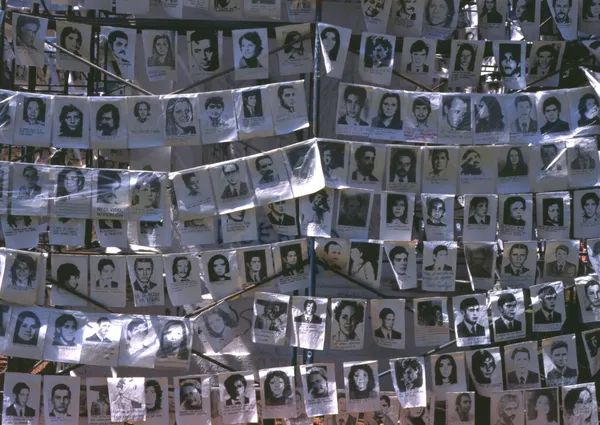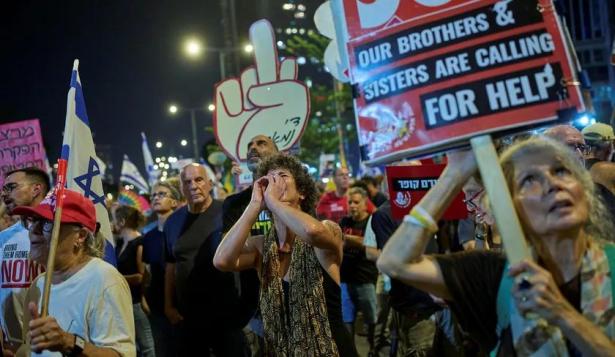Opinion | October 7 Wasn’t the First Time Israel’s Government Abandoned Jews for Political Gain
Many Israelis stress that Hamas' attack on October 7, 2023, was the biggest massacre of Jews since the Holocaust. But that's not exactly true. The junta that controlled Argentina from 1976 to 1983 murdered many more Jews than Hamas did.
Just like Hamas, the junta benefited from cooperation with right-wing Israeli governments. But unlike Hamas, it continued to benefit from cooperation with those governments and the Israel Defense Forces in the form of weapons and training, even after it was known that these weapons were being used to murder Jews, and that thousands had been "disappeared" or thrown to their deaths from airplanes.
Almost two years have passed since October 7, yet Israeli hostages are still imprisoned in the tunnels of the Gaza Strip, and the bodies of those who have died are decomposing in foreign soil. The government that promised to bring them back at any price continues to prioritize ethnically cleansing Gaza over their lives.
But for anyone familiar with Israeli history, this abandonment is unsurprising. It's part of a well-documented pattern of prioritizing ostensible economic and strategic interests over Jewish lives.
I have read tens of thousands of Israeli documents from the period of the junta. Most will remain classified for the next 90 years, even though next March will mark the 50th anniversary of the junta's takeover of Argentina's government in a military coup. But one conclusion applicable to the Israeli hostages in Gaza should already be clear – the hostages' families must not believe a single word that cabinet ministers or IDF officers say.

Pictures of those 'disappeared' by the military junta between 1976-1983 hanging in Plaza de Mayo, Buenos Aires, Argentina.Credit: \ Azavedo / ullstein bild / Gett
Back then, they lied to the families of the Jews who were disappeared in Argentina. They told those families they were doing everything they could to find the missing Jews, but in truth, they did almost nothing. Israel's interest in selling arms and obtaining support for the Israeli occupation always took precedence, and this led successive governments and the IDF to indirectly collaborate in the murder of 30,000 people in Argentina.
Their families were told to be quiet because making noise would harm the efforts to free them. But in reality, the heads of the junta were the ones who demanded this in exchange for buying Israeli arms and supporting Israel in international forums.
Debates in the Knesset were shut down. Efforts were made to cleanse junta members of the charge of antisemitism. The Israeli media published propaganda that even the Argentine media would have been ashamed to publish, along with lies about the people who were disappeared. And Israeli officials cast doubt on what little information emerged from Argentina, even though they knew the truth.
Almost 12 percent of all the people murdered by the junta were Jews, even though Jews constituted only 1 percent of Argentina's population. And during this time, Israel sold the murderous junta arms worth almost $1 billion. Argentine generals, who drew swastikas in their torture chambers, interrogated Jewish prisoners and raped them, received fighter jets, missiles, rifles, surveillance equipment, antitank missiles and military training from Israel.
Roughly 30 percent of Israel's arms exports during that period went to the Argentine army. Israeli pilots were sent to train the Argentinian pilots who flew the planes from which people were hurled to their deaths. IDF representatives Haim Laskov and Motta Gur visited Argentina and were received with great honor by junta head General Roberto Viola.
Did Israel not know about the fate of Argentina's Jews? American documents shed light on this question. One dated June 24, 1976, shows that Israeli sources knew the Argentine regime was systematically kidnapping and murdering left-wing activists. According to one Israeli source quoted in the document, Israel knew as early as 1976 that the proportion of Jews among the murder victims was high.
Yet that same source defended Israel's continued cooperation with the junta with the astonishing claim that this wasn't antisemitism on the regime's part, but merely stemmed from the fact that Jews were disproportionately represented among the academics and intellectuals who had become subversive left-wing activists. It's true that Jews were heavily represented in those groups. But the use of this argument shows the extent to which Jewish lives were subordinated to other interests.
Renee Epelbaum, whose three children were kidnapped and murdered and who was one of the founders of the Mothers of Plaza de Mayo, once said, "We didn't want to know that our children were murdered with Israeli arms. We remember the slap in the face we got from the leaders of the Jewish community, who told us that what had happened to us was our fault, because you didn't raise your children to be Zionists.'"
The American documents contain evidence that, on orders from the Israeli government, the Argentine Jewish community leaders also justified the junta's actions, arguing that they were aimed only at left-wing activists. Israeli officials stressed the extent to which the junta's leaders were proud of the cooperation of Jewish communal leaders, quoting them as saying that "if you tell community leaders to jump from a 20-story building, they'll jump."
The Israeli government's real interests in continuing the war in Gaza are clear, just as they were in Argentina. The government needs the war to stay in power, the defense industry needs it to continue turning a profit and the generals need it to cover their failure on October 7.
And the hostages? Like the Jews who were disappeared in Argentina, they have become the victims of a state that claims to represent the Jewish people but has repeatedly prioritized other interests over both the Jewish people and Jewish lives.

People hold signs of the hostages held in Gaza as the images of the six hostages murdered by their Hamas captors a year ago in Rafah are shown on the screen at Hostage Square in Tel Aviv on Saturday evening.Credit: Moti Milrod
What are the lives of a few Marxist Jews compared to the security of an entire nation? After all, we have to sell arms to survive, and we have to obtain support for the country, which even back then had become a pariah due to the occupation. And today, we have to carry out ethnic cleansing in Gaza; otherwise, the October 7 attack will happen again.
With regard to Argentina, Israeli officials argued at the time that selling arms would help the Jews there. But concerning Gaza, the government doesn't even bother to explain how the bombings are supposed to bring the hostages home. It just keeps bombing, and the Israeli public, blinded by propaganda and racism, refuses to see the simple truth: The government that sold arms to the murderers of Jews yesterday will also abandon Jews today.
The hostages' families, like the Mothers of Plaza de Mayo in Argentina, continue to demonstrate and demand answers. But history is repeating itself in the form of a calculated choice by a government that never intended to protect all Jews, but only those who serve its interests.
The hostages in Gaza, like the Jews who were disappeared in Argentina, are proof of the fact that the Jewish state is willing to sacrifice Jews on the altar of its economic and political interests. But this time, we can't claim that we didn't know.
Don't believe a word the government says. Like all Israeli governments, Prime Minister Benjamin Netanyahu understands nothing but force. And if you let them, they will prioritize their narrow interests over Jewish lives. That was true in the death camps in Buenos Aires back then, and it's true in the tunnels of Gaza today.
[Portside moderator -- also of interest: Analysis -- Despite Israelis' Indifference, Deadly Strike on Gaza Hospital Could Change the Course of the War]
Sebastian Ben-Daniel is an Israeli academic and writer often working under the pseudonym John Brown. He is a lecturer in computer science at Israel’s Ben Gurion University of the Negev and contributes to +972 magazine and Haaretz, among others.
Founded in 1919, Haaretz is Israel's oldest daily newspaper and one of its most influential media outlets. Known for its commitment to high-quality journalism, Haaretz has built a reputation for in-depth reporting, insightful analysis, and a liberal and progressive editorial stance on domestic issues and international affairs.
Our commitment to staunchly independent journalism has made us an essential source for those seeking a deeper understanding of the complexities of Israeli society, the Jewish world, the Palestinian territories and the broader Middle East.
In 1997, we launched an English-language edition to cater to growing international interest in Israel and the region.
Haaretz in English provides translations of the original Hebrew content as well as exclusive articles and analyses tailored specifically for our international audience.
Today, Haaretz.com is one of the most widely read platforms for Israel-related news and analyses, attracting millions of readers from around the world, including academics, policymakers, diplomats, and journalists.


Spread the word